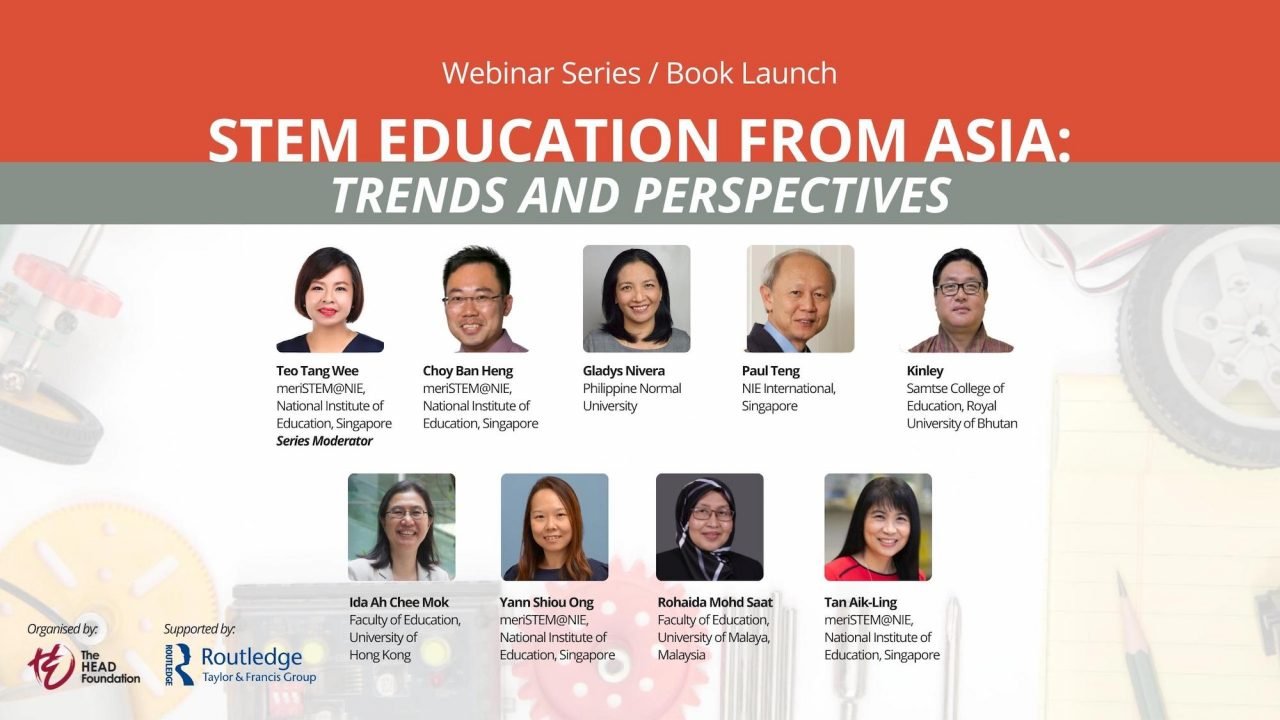Webinar Series on STEM Education from Asia: Trends and Perspectives
On 7 and 9 March 2022, The HEAD Foundation hosted a two-part webinar series with contributors of the book STEM Education from Asia: Trends and Perspectives for an insightful sharing on innovative STEM education policies in the region, particularly on teacher education, curriculum and research.
Moderator and co-editor Associate Professor Teo Tang Wee from the National Institute of Education, Singapore highlighted the growing interest in STEM education in the last two decades. This is in part driven by the Fourth Industrial Revolution that catalyses rethinking about how education should evolve to meet the demands for a future workforce equipped with 21st Century Competencies.
Co-editor Professor Paul Teng, Managing Director of the National Institute of Education International, shared that policies on their own are only articulations of intent by governments; they have to be backed by guidelines, statutes, directives and supporting measures. This sentiment is echoed by Assistant Professor Choy Ban Heng, co-head of meriSTEM@NIE in Singapore, who affirmed that the improvement of STEM education has to be seen as confluences of different educational aspects beyond a single change. Educational policies, initiatives and practices need to be in sync with the purpose. Using STEM teacher education in the Philippines as an example of responding to a confluence of country-specific factors, Professor Gladys Nivera from the Philippine Normal University elaborated how there needs to be consistency of programmes across the country, a focus on capacity building of educators and administrators, and harmonisation across the system to move towards the same goal to achieve results. Assistant Professor Kinley, Royal University of Bhutan, agreed, sharing that the Bhutanese government’s priority to enhance STEM education has led to creating urgency in the pathways towards doing so.
In the same vein, Associate Professor Ida Ah Chee Mok from the University of Hong Kong highlighted that teachers can only work within the various constraints of the system that includes policy, resources and concerns for the school vision and stakeholders. Similarly, co-editor Associate Professor Tan Aik Ling from meriSTEM@NIE, posited that the way forward involves asking pertinent questions such as: “What is the nature of STEM leadership that will develop and support teachers of STEM to design and implement meaningful STEM curriculum?”, and “What are the factors that affect partnership between schools, industry and the community, and what partnership model would result in mutual benefits for all stakeholders?”
To round things up, the session looked at STEM education research in Asia and how the region can envision a new education paradigm. Professor Rohaida Mohd Saat from the University of Malaya shared heartening news of an upward trend in the number of research articles on STEM education in Malaysia. However, current research focus on individual disciplines or two disciplines and she recommended that future research should move towards multidisciplinary or interdisciplinary STEM, in line with the nature of STEM. Assistant Professor Yann Shiou Ong from the National Institute of Education, Singapore proposed an integrated STEM education as a paradigm of future-orientated education; many would agree that the final form of knowledge of various disciplines is not as critical as 21st Century Competencies and life skills to help students thrive in the Fourth Industrial Revolution.
Over the two sessions, the speakers touched on the importance of cohesive policies and supporting measures to balance ground-up initiatives and top-down planning. Many panellists also linked back to the importance of STEM education in nurturing critical thinkers to thrive in the Fourth Industrial Revolution. To get more insights from these speakers and other contributors, read more about the book, published under Routledge’s Critical Studies in Asian Education.

